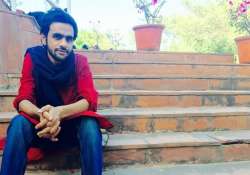We Fear we Might be Attacked: Umar Khalid
New Delhi: Out on bail after spending more than three weeks in Delhi's Tihar Jail for sedition over alleged anti-national slogans, JNU student-activist Umar Khalid has said he and his other university colleagues were wary

New Delhi: Out on bail after spending more than three weeks in Delhi's Tihar Jail for sedition over alleged anti-national slogans, JNU student-activist Umar Khalid has said he and his other university colleagues were wary of a pre-planned attack by right-wing Hindu groups.
In an interview with IANS, Khalid, 28, said that he was under a constant "threat" even after being conditionally set free by the Delhi High Court.
"The threat remains. I still feel I am deprived of my freedom. We are not free. Threat stays even now," Khalid said, seated in the Jawaharlal Nehru University (JNU) lawns where he had allegedly shouted anti-India slogans in a controversial event on Kashmir in February.
"We fear that we might be attacked. And we know that it will be a highly planned attack," the PhD scholar said.
And who does he think could attack him and five other JNU students, including their union leader Kanhaiya Kumar, branded anti-nationals?
"The tragedy of our country at this time is that to speak of freedom is a crime. Those who are ruling us want to push us into slavery. They want to ban thought, ideas. But they can't be banned."
He said it has become clear after the controversy around JNU's Kashmir event that the Rashtriya Swayamsevak Sangh (RSS) is employing a new tactic, which actually is "old wine in a new bottle".
"They had earlier divided (the nation) on religious lines and it was a Hindu-Muslim binary. What has changed of late is that, the binary has been replaced with nationalist (versus) 'anti-nationals'," said Khalid, a born Muslim but who believes in Marxism.
"Those who do not subscribe to their (RSS') ideology are 'anti-nationals'." He said he himself doesn't believe in "nationalism - an ideology always used by fascists".
"World wars have been fought and genocides have happened in the name of nationalism," he said.
Asked if he thought the Congress would have dealt with JNU students differently, Khalid said the previous government "did not go after educational institutes, the way the BJP is doing".
"It is inherent to RSS' and BJP's functioning. They want to saffronise institutes and re-write the (country's) history," he said, adding it was the only subtle difference between the Congress and the BJP governments.
In terms of economic and foreign policies, he said, both largely shared the vision.
About the Kashmir issue that raised the political brouhaha leading to his arrest, Khalid said he didn't "think it is seditious to say Kashmir is an important issue to resolve".
He didn't believe that either Pakistan or the Indian government was dealing with the issue from a humanitarian point of view.
"Both, except for political, economic and strategic interests, have not seen Kashmir from any other prism," Khalid said, adding "people of Kashmir are missing" in their approach towards Kashmir.